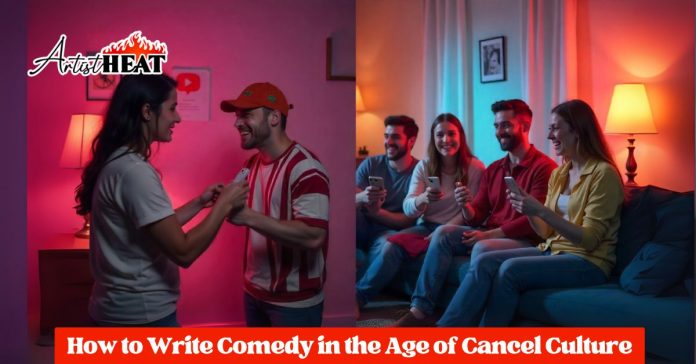In 2025 comedians are most likely to perceive life as a minefield where all you have to do is trip over a badly placed safety pin and ka-boom you are the new must-watch act, though probably in the wrong direction. But nevertheless, there are still those who are making us laugh, laugh-cry, and sometimes make us question our decision of life at 3 AM when going through TikTok.
How to write comedy in the age of cancel culture isn’t just about avoiding the obvious pitfalls anymore. It is all about realizing that comedy has been upgraded to being more subtle, more observant, and more rebellious than ever. It is not a question of whether one at the age is still funny, the question that matters is whether one dared be smart.
The New Comedy Playground
The state of comedy in 2025 is completely different in comparison to what it was a few years ago. The algorithms on social media determine who can be funny, AI can compose jokes quicker than you can say ChatGPT and people have shorter attention spans than a fruit fly on espresso. The twist here however is that this crazy world has only contributed to making comedy more creative not less.
The social sites have multiplied like rabbits. TikTok comedy does not land in the same way as Instagram reels, which does not land in the same way as YouTube shorts, which does not land in the same way as whatever the hell Elon is referring to Twitter as this week. Each platform has its own comedy language, and mastering how to write comedy in the age of cancel culture means speaking all of them fluently.
Understanding Your Audience Without Losing Your Soul
The major issue of most of the new comedians is that they want to be liked by everyone. Spoiler alert: you can not. It is unlikely that even Mr. Rogers did not have haters (or even they just had a bad day). The trick is to find your tribe and talk their language and also remain yourself when it comes to comedic voice.
Your 2025 audience is more diverse, more informed and more vocal than before. They do not want comedians to tiptoe on eggs, they want sincerity couched in creativity. Just imagine a comedian such as John Mulaney who is actually able to discuss some of his personal experiences with addiction and turn it into comedy without trivialising. Or Tig Notaro, who used her breast cancer diagnosis to create some of the strongest comedy ever written and practiced.
The Art of Punching Up, Not Down
This is where how to write comedy in the age of cancel culture gets interesting. The ancient rule was very basic; comedy is tragedy plus time. The new formula is more complicated: comedy is a formula of insight + empathy + perfect timing + possibly some chaos added.
Punching up involves the targeting of powerful, privileged or platform-ed people with a greater platform than yourself. It mocks tech billionaires, politicians, or that influencer, who believes that he/she invented breathing techniques. Punching down describes using violence to attack oppressed groups or individuals that have no ability to respond. It is not even ethically wrong, but slothful writing.
The genius aspect of punching up is that it is renewable with infinite possibilities. Strong personalities will never cease to do something preposterous. Did you know what is going on in the news? It would be a dream come true of a comedy writer and at the same time it would be horrible seeing this is real life.
Reading the Room in the Digital Age
The “room” isn’t just a physical space anymore – it’s every screen, every comment section, every platform where your content might live forever. How to write comedy in the age of cancel culture requires developing a sixth sense for digital atmospheres.
The other does not imply paralysis with fear. It implies that you are deliberate with your decision. Whenever Dave Chappelle drops a new special, he is fully aware of what kind of discussions it will initiate. When Trevor Noah uses a political joke, he has already worked out the angles. They are not just falling into a controversy but are manoeuvring their ways through it.
The Authenticity Advantage
This is one thing that does not happen at comedy courses: being genuine is your ace card. Fake is toast at a thousand paces, and in 2025, audiences are so exasperated at performative anything that it makes me shudder. That is where your comedy goldmine is: your personal experiences, what you have actually seen and what you have actually thought.
Consider comedians such as Hasan Minhaj, who employs cultural circumstances not as a punchline but a lens. Or Ali Wong, who made a comedy special out of pregnancy and motherhood, and transformed the idea of what women were allowed to joke about. They are not shying away behind their identities, they are extracting a content out of their identities.
When you’re figuring out how to write comedy in the age of cancel culture, remember that your specific perspective is what makes you uncancellable. You can’t be canceled for being genuinely yourself, because nobody else can be you.
The Comeback Game
Even the most cautious comedians fail to hit the bulls eye occasionally. The reaction might make all the difference between a career-ending error and a learning experience. The internet takes to redemption stories but the redemption must appear very real.
Consider the case of Kevin Hart hosting Oscars. Regardless of whether you find that it was proportional or not he was part of the way he handled it. Juxtapose that to the comedians who up the ante, performs the victim, or the role of the victimization by the so-called woke culture. The audience can distinguish the one who learns, and the one, who is merely unhappy that he or she is caught.
Platform-Specific Comedy Strategies
TikTok humour is fast meditative and it can typically use the popular sound or the pattern. Instagram comedy should be able to perform in both feed and stories. One can have more time in YouTube and character development. Twit(ter) (or what ever we are terming it) is more of timing and being concise.
Understanding how to write comedy in the age of cancel culture means adapting your voice to each platform without losing your core identity. It’s like being a comedy chameleon, but one that doesn’t completely change colors.
The Business of Being Funny
In 2025, comedy is not only about making people laugh, it is about creating the sustainable business in an attention economy. Comedians have almost entire entertainment businesses subsidiaries in Brand partnerships, sponsored content, merchandise, and live shows, streaming deals.
This is indeed a business element that offers more freedom as against curtailing it. You are able to be more inventively risky when you do not depend on the conventional gatekeepers. You will be able to create immediate contact with your listeners. When something does not work, you can be faster in making a shift.
Future-Proofing Your Comedy
As we look toward the rest of 2025 and beyond, how to write comedy in the age of cancel culture will continue evolving. AIs will become more funny (and this is both thrilling and scary). The virtual reality comedy experience may become something. The attention economy is most likely to become even more disorganized.
Comedians that survive will be curious, authentic and still grounded in the human experience. And after all, it is all about the comedy at the end of the day, where one has to find the universal in the particular, the large in the small and the light in the darkness.
The Final Punchline
How to write comedy in the age of cancel culture isn’t about walking on eggshells or censoring yourself into blandness. It is all about being more intelligent, purposeful, and aware of your audience than ever. It is about getting to know that along with great platform comes great responsibility and opportunity.
The top comic performers of 2025 will not be the ones that avoid the controversy issue, they will be those who will enjoy better dialogues regarding the same. They are those that make the truth uncomfortable into communal laughter. They are the ones who show that even in cancel culture, comedy does not go away dead, it only becomes more interesting.
Write that joke then. Upload that clip. Make that risk. That is, just ensure that you are doing it purposefully, genuinely and perhaps with a Plan B. The reason being that, in the end, there is nothing worse than being canceled than being boring.

